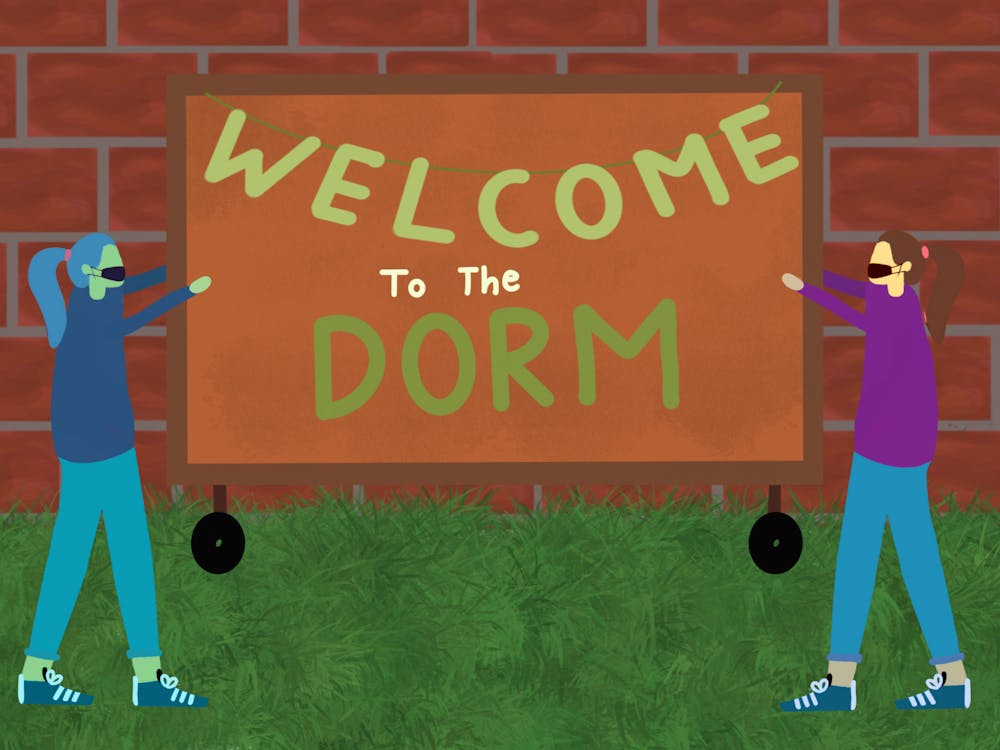As the familial minivan drives away, students are left on their new front door in Athens. Equipped with a dorm key, a meal plan and their favorite belongings, they have moved away from home — most for the very first time.
For freshmen just arriving to Ohio University’s campus, college can be terrifying. Luckily, resident assistants, or RAs, can help them to build connections at their new homes through in-hall events.
According to the university’s 2021-2022 budget, Housing and Residence Life allots $5,943,547 for supplies, services and capital costs. Jen Maskiell, director of Residence Life, said $96,550 of that budget was allocated to the resident director programming accounts for this year.
Maskiell said RAs must work with their professional staff to request funds for programming, which is then allocated by hall or complex. There is no spending cap, and Maskiell said staff typically are aware of the total amount they have for the year. She said RAs are encouraged to hold events but are not required to commit to any specific amount.
“The goal is to develop a community that meets the needs of those living in the space, not just creating programs to have programs,” Maskiell said in an email.
Nicole Powers, a sophomore studying athletic training, works as an RA in Jefferson Hall. Powers said she has never had issues getting funds for her hall activities.
“I haven't felt any limits in asking for anything,” Powers said. “It's not like we're trying to be super frugal. I'm not asking for anything big, fancy popcorn machines or anything like that, but it hasn't been a problem.”
Maskiell said the school budgets for programming in order to help ensure students are able to participate and facilitate a good hall environment.
“It is important that we invest in the residential student experience,” Maskiell said in an email. “By allowing RAs access to funding, they have the ability to be creative and provide opportunities that may not otherwise be available. This funding allows our staff to provide resources to students at no cost, while at the same time often support their well-being, connectedness, and experience in their community.”
Max Gilliland, a sophomore studying statistics, said he attended one of his in-hall events involving budgeted funding. He said he participated in an RA-led trivia bonding night earlier this year.
“It was a movie trivia night for a ($25) Chipotle gift card,” Gilliland said. “We played a round of Kahoot, and whoever won the trivia got the gift card.”
Powers said she enjoys hosting activities, although participation has begun to decline a little from the start of the semester as residents’ schedules get busier. In response, staff sometimes will host stop-and-go events or events in which students are not required to commit long periods of time to the activity but, rather, can simply walk by and briefly join.
Powers’ favorite event of the year so far was one of the stop-and-go events, which Jefferson Hall hosted as midterms picked up in order to help residents combat stress. The event consisted of a table full of snacks as well as big boards on which residents could share study tips and reflect on why they are here and what they are working for.
“It was just really neat to see what everybody was working towards and see how much is going on in the building,” Powers said.
As the semester begins to come to a close, Powers said she hopes to have at least one more outside activity, which she prefers over inside, as students can then take off their masks and experience a bit more normalcy.
“With finals coming up and people getting stressed towards the end of the semester, (I’m) just (planning on) giving people an outlet to relax and take it easy,” Powers said. “I'd like to do one more thing outside before it gets too much colder.”
Powers said her own experience as a resident was made much better last year by her RA, who worked hard to make the COVID-19-tainted freshman experience as normal as possible. Powers’ RA planned a virtual Halloween party for their hall when they were online in the fall and held door decorating competitions and Zoom nights to help the floor bond safely once they were in person.
“My RA was fantastic,” Powers said. “She is the reason that I became an RA this year, just because she was so good about trying to make that year as good as possible.”
That positive impact inspired Powers to be an involved RA this year and make sure her residents felt that same relief upon coming to campus.
“I wanted to be able to provide some comfort and guidance for first-year students coming in so that they could know where to go and what to do in a totally new place,” Powers said. “I came from out of state. I didn't know anything about OU before I came here. My RA was my first familiar face on campus and somebody that I knew, and so I just really liked having the opportunity to be that for some of these girls.”
Maskiell said RAs try to provide that comfort for new students, and it is often the smallest activities that can make the best memories.
“There are so many activities and sometimes the simplest ones have the greatest impact,” Maskiell said in an email. “In hearing from staff, it seems ones that bring students together to talk, watch movies, or share food have really helped in creating an open and connected community.”
Editor-in-Chief






